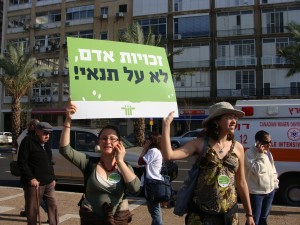
The Jerusalem Post, December 18, 2009
Led by over one hundred NGOs, thousands of people gathered in Tel Aviv on Friday to unite under the banner of human rights. The rally, organized by the Association for Civil Rights in Israel (ACRI) and timed to coincide with International Human Rights Day, centered on the theme “en matsav!” (no way!). The slogan was intended to express the idea that the erosion of democracy and infringement of human rights is always unacceptable, in any circumstances.
In a public statement regarding the demonstration, Yael Maizel of ACRI said, “They tell us human rights are a luxury for peacetime. They tell us not to be naïve, that security comes first…. We need to remind Israeli leaders and the general public that there is no security without human rights; that there is no way we will tolerate racism and discrimination in our communities and that we will not allow our democracy to fail us.”
Despite the gravity of the cause, the atmosphere was exuberant—the gathering felt more like a celebration of human rights than a protest. As the crowd amassed at Rabin Square a drum line assembled and, standing in a circle, tapped out a sharp beat on snares. A large group of young Israelis—unaffiliated with any of the NGOs—who looked like they’d just gotten back from India entertained passersby with stick juggling and a boom box that pumped Bob Marley into the air. Young families with infants and toddlers joined the throngs; a father hastily made a sign with cardboard and blue paint, affixing it to his children’s stroller. A little girl donning a festive outfit of a flowered top, bright red pants, and neon orange crocs looked on, eating Bamba.
But the message—or, rather, the many messages—were not lost in the excitement.
Glancing at the crowd was like reading a list of Israel’s varied human rights organizations and social issues. A cluster of Israelis donned white shirts with pink lettering: “United against the deportation of children.” A group gathered under a white flag emblazoned with black and red letters: Shalom Akshav. Women from Machsom Watch held placards decorated with their trademark—a vigilant eye—into the air. African asylum seekers bearing signs that demanded an end to racism stood near a large banner—carried by two Israelis—that read “Refugee Rights Now” in English. A Hebrew sign offered support for equal education for Bedouin children. Employees from NGOs like Physicians for Human Rights-Israel, Yesh Din, and Human Rights Watch hoisted their organization’s names high. And rainbow flags announced the presence of groups like the Israel Gay Youth Organization (IGY).
After reaching a critical mass, the march began. Turning onto David HaMelech Street, the thousands walking on behalf of Israeli democracy and human rights were met with a handful of counter-protestors. They stood on the corner of Ibn Gvirol clutching signs that asked, in Hebrew, “What about Jewish human rights? Tel Aviv settlers wake-up!” The crowd, which, according to some estimates, numbered over 5000, ignored the potentially inflammatory message.
As the march passed the Rabbinical Court of Tel Aviv, members of the Israel Religious Action Center (IRAC)—a NGO that supports religious pluralism—stopped and proudly thrust their blue and white placards, adorned with a Star of David, into the air. “There is more than one way to be Jewish,” the sign said.
Anat Hoffman, Executive Director of IRAC remarked that the gathering was “a historic first and I wish it will become a tradition.” Noting the sunny day and clear sky, she added, “The weather is right, now we just need the social climate.”
Hoffman, who sat on Jerusalem’s city council for 14 years, feels that dark clouds are gathering around Jerusalem. “The city is becoming more violent and the underpinning is religion.”
Tel Aviv offers Israel a hopeful counterpoint, she said. “This [rally] couldn’t have happened in Jerusalem,” Hoffman said. And if it had, “there would have been much more police.”
Shevy Korzen, Executive Director of the Hotline for Migrant Workers, was equally enthusiastic about the event. “It’s a great day for human rights,” she said. “This is a reminder that there are different populations in this country—all human, all equal, all with hopes and dreams. It’s a reminder to respect diversity.”
The march ended at the courtyard of the Tel Aviv Museum, where latecomers joined the crowd and various organizations, including animal rights activists, distributed information to the curious. Erez Katsav, a member of the group Anonymous for Animal Rights, commented, “Animal rights and human rights are one struggle. It’s about raising tolerance for each other—tolerance for people, tolerance for animals.”
A stage was back-dropped with a green swath bearing a simple message in Arabic, Hebrew, and English: “Human rights march.” Following a short speech, writer and ACRI president Sammi Michael honored the family of Nir Katz—one of the two victims of the summer shooting at Tel Aviv’s Gay and Lesbian Youth Center—with the Emil Greenzweig Human Rights Award. Michael also presented the award to the founders of Yesh Din, Paul and Ruth Kedar.
As other speakers, including Nazareth Mayor Ramiz Jaraisy and Balad MK Hanin Zuabi, addressed the crowd, the event took on a political edge. Additionally, parties like Shinui, Meretz, and Hadash showed a strong presence in the audience.
Speaking to the Jerusalem Post as the musical acts, which included singer Alma Zohar and hip-hop group Hadag Nachash, began Meretz MK Nitzan Horowitz remarked that his attendance had “nothing to do with the [political] party. It has to do with democracy, human rights, democratic values, pluralistic values… It’s important for every Israeli to be here.”